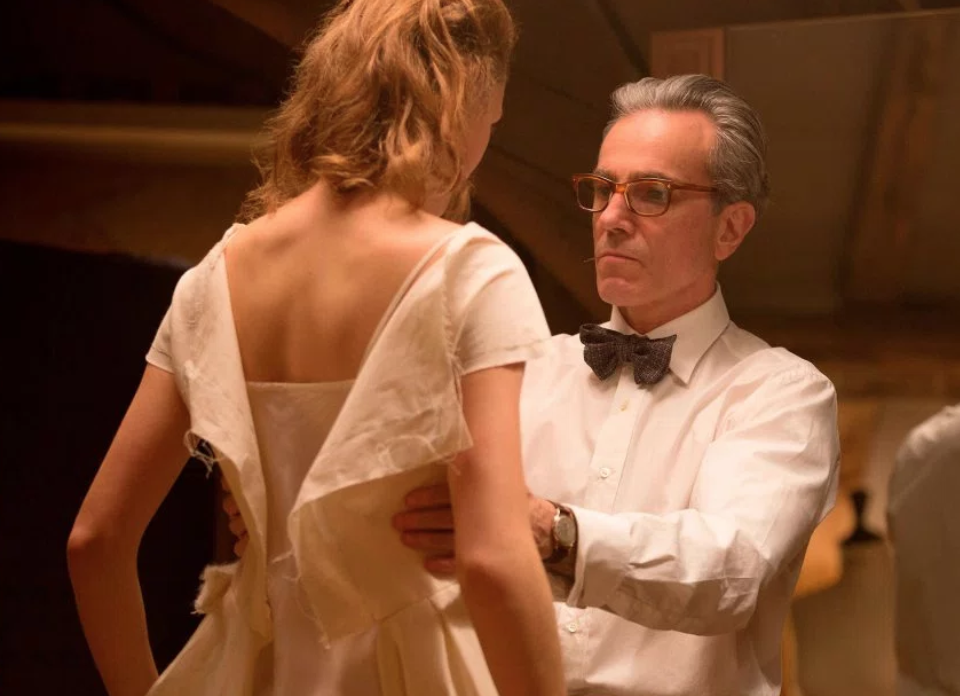“You’ve got style, that’s what all the girls say.” And so they do of Reynolds Woodcock (Daniel Day-Lewis)–not the finest last name for a man who is, well, a bit of a cock. But still, he’s apparently earned the right to be as one of the foremost dressmakers in all of Europe, sought after by courtiers and other royalty of the like. Contrarily, Alma Elson (Vicky Krieps) is no heiress or socialite, yet rather just the Plain Jane sort that Reynolds usually gravitates toward throughout his bachelorhood as a means of mining inspiration and a bit of “companionship.” That’s 1950s code for someone to bang on the regular–for no, he is not gay as one might believe of the “man in fashion” stereotype. Albeit he does certainly possess some of the traits: like an overly unhealthy obsession with his dead mother and relying on his RuPaul-esque in clipped demeanor sister, Cyril (Lesley Manville), for just about everything, including breaking up with his girlfriends.
Alma, nonetheless, is immune to these hindrances as she finds herself able to ascend in the ranks of value at the House of Woodcock, even in spite of her more “uncouth” habits, like buttering her bread too loudly or pouring her beverages with too much bombast. In the past, Reynolds would have shut out the additional phantom woman at the breakfast table with the insistence, “I can’t deal with a confrontation right now.” But with Alma, there is something different, something that indicates she possesses more power over Reynolds than those who preceded her. Plus, she’s got a weapon to dress him up in that no other woman has been able to allure him with before: love. Yes, maybe this Madonna song should have served as the closer for the credits. But more than her love is the artifice with which she loves–her ability to play mind games with Reynolds right back.
As Reynolds’ sister and on-demand sewing team make clear from the outset, a man is nothing without the army of women that keep his empire operational. And every army needs a leader. While Cyril is reluctant to let go of that post, Alma’s acceleration through the echelons of the house can’t be ignored, even though, at the outset, it appears she is the only one who can get hurt in this permutation, with Reynolds declaring, “I think expectations and assumptions are what cause heartache,” after their first date. The same session during which he takes all her measurements with Cyril watching and writing each number down. There’s a certain Norman Bates quality to it all–along with his stories of Mother, and liking the idea that “the dead are watching the living.” One eerie scene in particular drives Reynolds’ theory home.
But all the while, Alma endures Reynolds’ eccentric and overly fastidious behavior with a resilience that is both stoic and defiant. One instance of her so doing involves “making a surprise” for Reynolds that requires the cooperation of Cyril to help her empty the house. Cyril, more aware than anyone of Reynolds’ sensitivity about breaking routine, cautions, “I must advise against this.” In the end, of course, Alma triumphs, though not in the reaction she gets from Reynolds–one that is expectedly miffed based on Cyril stating, “Good luck” in the Miranda Priestly fashion of, “That’s all” as she leaves Alma to her inevitable verbal lashing.
Their relationship’s push and pull–like a threaded needle to a garment, naturally–intensifies the drama as the narrative takes a bizarre shift in the third act. And just when you think that Alma is done for, doomed to be cast out like all the previous dames who weren’t up to the challenge of being dressed in Reynolds’ mind games, she cooks up a little jeu of her own. Let’s just say the twist of the film offers something decidedly akin to the one in The Beguiled, except the part where there’s a fatality. In both films, however, the power struggle between the opposite and opposed genders in love mirrors their power struggle in life. And just as Alma is not so willing to be merely a used and discarded muse without at least getting something concrete in return, chiefly, some level of control, neither are most women in the present. In this way, 1950s high society and fashion feel more pertinent to the gender politics of now than any viewer might have expected. And once again, Paul Thomas Anderson is just the man to deliver a statement on presumed male supremacy (see, among other of his characters: Tom Cruise as Frank “T.J.” Mackey in Magnolia).






















